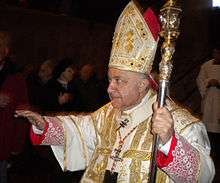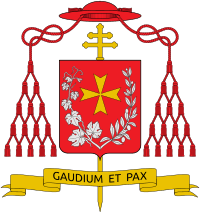Dionigi Tettamanzi
| His Eminence Dionigi Tettamanzi | |
|---|---|
| Cardinal, Archbishop Emeritus of Milan | |
 Cardinal Tettamanzi in Lodi, on 19 January 2001 for the feast of Saint Bassiano. | |
| See | Milan (emeritus) |
| Appointed | 11 July 2002 |
| Installed | 14 September 2002 |
| Term ended | 28 June 2011 |
| Predecessor | Carlo Maria Martini |
| Successor | Angelo Scola |
| Other posts | Cardinal-Priest of Santi Ambrogio e Carlo |
| Orders | |
| Ordination |
28 June 1957 by Giovanni Battista Enrico Antonio Maria Montini (later Pope Paul VI) |
| Consecration |
23 September 1989 by Carlo Maria Martini |
| Created Cardinal |
21 February 1998 by John Paul II |
| Rank | Cardinal-Priest |
| Personal details | |
| Birth name | Dionigi Tettamanzi |
| Born |
14 March 1934 Renate, Italy |
| Nationality | Italian |
| Denomination | Roman Catholic |
| Previous post |
|
| Motto |
Gaudium et pax (Joy and peace) |
| Coat of arms |
 |
| Styles of Dionigi Tettamanzi | |
|---|---|
 | |
| Reference style | His Eminence |
| Spoken style | Your Eminence |
| Informal style | Cardinal |
| See | Milan (emeritus) |
Dionigi Tettamanzi (born 14 March 1934) is an Italian Cardinal of the Roman Catholic Church. He is Archbishop Emeritus of Milan, and was elevated to the cardinalate in 1998. Previous to his service in Milan, Tettamanzi was Archbishop of Genoa.
Biography
Early years
Tettamanzi was born in Renate, then in the province of Milan (now in the province of Monza and Brianza).
He was educated at the Minor Seminary of Seveso and the Seminary of Venegono Inferiore and finally at the Pontifical Gregorian University in Rome where he earned a doctorate in theology.
After studying in local seminaries, he was ordained a priest on 28 June 1957 by Archbishop Giovanni Battista Montini (the future Pope Paul VI). He served in the Archdiocese of Milan as a pastor and faculty member of the Minor Seminary of Masnago and of Seveso San Pietro from 1960 until 1966. As well as a faculty member of the Seminary of Venegono from 1966 to 1986.
Bishop
On 1 July 1989 Pope John Paul II named Tettamanzi archbishop of Ancona-Osimo. He received his episcopal consecration from Jesuit Cardinal Carlo Maria Martini at the Milan cathedral on the following 23 September. Upon being chosen Secretary-General and Vice President of the Italian Episcopal Conference, Tettamanzi submitted his resignation as bishop on 6 April 1991.
John Paul II called Tettamanzi back into active ministry by appointing him to the Archdiocese of Genoa on 20 April 1995. At the consistory of 21 February 1998, Tettamanzi was created Cardinal-Priest of Ss. Ambrogio e Carlo. When Cardinal Martini retired, Tettamanzi was reassigned as archbishop of Milan on 11 July 2002.
With the death and funeral of Pope John Paul II came intense speculation as to his successor. Tettamanzi's position as head of an archdiocese that was historically seen as a step towards the papacy (and considered one of the wealthiest and most powerful of Italian dioceses), as well as his charisma and popularity among the people, placed him in the view of the Italian press as one of the overall favorites to become John Paul II's successor. He himself seemed to count on success, arranging an elaborate photo-call on his departure from the diocese for the conclave. The press presented him as one of the leading Italian candidates, but the Italian cardinals are now a minority in the college. Moreover, Tettamanzi's less than imposing figure did not impress on an international level. There were reports that he never got more than two votes in the ballots. The choice in fact fell on far better known German Cardinal Ratzinger, who become Pope Benedict XVI. Cardinal Tettamanzi, having reached the age of 80, is no longer eligible to vote in conclaves.
Tettamanzi is said to speak only Italian. He is little known outside his own country.
In response to the motu proprio, Summorum Pontificum of Pope Benedict, Cardinal Tettamanzi controversially stated that the document did not apply to the northern Italian archdiocese since it uses the Ambrosian Rite rather than the Roman one.[1]
On 20 March 2008, Tettamanzi issued the New Ambrosian Rite Lectionary, previously confirmed by the Holy See, that supersedes the 1976 experimental edition.
In March 2009, as required upon reaching the age of 75, he submitted his resignation.[2] Pope Benedict XVI did not accept the resignation at that time and it was believed that Tettamanzi would not leave his post in the next two years.[3] Pope Benedict accepted Cardinal Tettamanzi's resignation on the 54th anniversary of his ordination to the priesthood and appointed Angelo Scola, until then Cardinal Patriarch of Venice, as his successor. Since his resignation Tettamanzi has lived in Triuggio.[4]
In July 2012 he was named apostolic administrator of the Diocese of Vigevano
He was one of the cardinal electors who participated in the 2013 papal conclave that selected Pope Francis.
Social teaching
Cardinal Tettamanzi has declared that the goal of a company is not only to create a profit for the shareholders but that the company has to be a community of women and men that work together to satisfy the needs of the people involved in the company. He also affirmed that a person needs to have stability in his work in order to be able to plan his life. In his speech to the Diocese, in the day of St. Ambrose 2008, he said that Muslims have the right to build their mosque in cities of mainly Catholic countries.[5] In his speech to the city on St Ambrose of 2010 he reaffirmed that not all the immigrants in Italy are criminals.[6]
References
- ↑ "Vatican to clarify motu proprio soon". The Tablet. 17 November 2007. Retrieved 17 June 2011.
- ↑ "Code of Canon Law: text – IntraText CT". Intratext.com. 4 May 2007. Retrieved 17 June 2011.
- ↑ Tosatti, Marco (15 March 2009). "Tettamanzi: ecco le dimissioni" (in Italian). Lastampa.it. Retrieved 17 June 2011.
- ↑ "Ora Tettamzni vive a Triuggio" (in Italian). incrocinews. 19 September 2011. Retrieved 31 January 2012.
- ↑ "Tettamanzi: "Moschee nei quartieri"" (in Italian). Tgcom.mediaset.it. 6 December 2008. Retrieved 17 June 2011.
- ↑ "Il richiamo del cardinale Tettamanzi: non tutti gli immigrati sono delinquenti. Scarcerato Fikri" (in Italian). Il Sole 24 ORE. 6 December 2010. Retrieved 17 June 2011.
External links
| Catholic Church titles | ||
|---|---|---|
| Preceded by Camillo Ruini |
Secretary-General of the Italian Episcopal Conference 14 March 1991–20 April 1995 |
Succeeded by Ennio Antonelli |
| Preceded by Giovanni Canestri |
Archbishop of Genova 20 April 1995–11 July 2002 |
Succeeded by Tarcisio Bertone SDB |
| Preceded by Carlo Maria Martini |
Archbishop of Milan 11 July 2002–28 June 2011 |
Succeeded by Angelo Scola |
| Preceded by Ugo Poletti |
Cardinal-Priest of SS Ambrogio e Carlo 21 February 1998–present |
Incumbent |